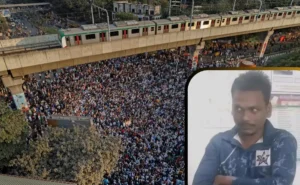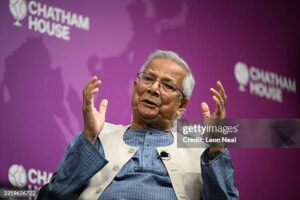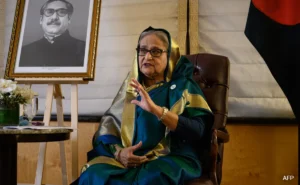A Hard Look at Recent Events in Kashmir — And the Role of Bangladesh Muslims
Across continents today, it feels like one painful headline after another: bomb blasts, shootings, religious killings, and all too often, the attackers claim they are fighting for Islam. Whether it’s the Middle East, Africa, Europe, or South Asia, a brutal pattern has emerged — terrorism and violence too often come with an Islamic flag waved over it.
The recent brutal killings of Hindus in Kashmir have once again ripped open old wounds. Innocent men and women, targeted simply because of their religion, were gunned down by Muslim terrorists operating with hate in their hearts. These attacks are not isolated. They are part of a much wider, deeper problem that the world must stop pretending is random.
It forces a very uncomfortable question: Is Islam, as practiced by certain groups today, creating mass chaos across the world?
The Tragedy of Kashmir: A Never-Ending Nightmare
For decades, Kashmir has been bleeding. What once was a land of beauty and brotherhood has become a battlefield between Islamist terrorists and ordinary civilians, especially Hindus who have lived there for centuries.
Radical Muslim groups, often supported from across the border in Pakistan, have terrorized the region. Hindus — labeled as infidels — are forced to flee or face death. This targeted killing is not new; it’s part of a well-organized campaign of fear that led to the mass exodus of Kashmiri Pandits in the 1990s, and sadly, it continues even today.
The question that haunts the world is simple but chilling: Why are these terrorists always Muslim?
The truth is: extremist interpretations of Islam are being weaponized across Kashmir. Jihadist ideology, taught and funded for decades by radicals, fuels these acts of horror. The killers believe they are martyrs, fighting a holy war. But in reality, they are murderers, turning a land of poetry into a graveyard.
Beyond Kashmir: A Global Epidemic
It’s not just Kashmir. Wherever there is unrest, one often finds radical Islamic elements deep in the chaos:
- ISIS’s brutal massacres in Syria and Iraq
- Boko Haram’s mass kidnappings and killings in Nigeria
- Al-Qaeda’s bombings from New York to Mumbai
- Lone-wolf stabbings, shootings, and bombings across Europe
Everywhere, innocent lives are crushed under the same false justification: a distorted idea of Islam that glorifies violence and martyrdom.
It’s important to be clear: Not all Muslims are terrorists, but a disturbingly high number of terrorists are Muslim. Ignoring this fact out of political correctness only delays solutions and puts more lives at risk.
The real Islam — if practiced as it was intended — is about peace, mercy, and compassion. But radical preachers, terror groups, and even some political leaders have poisoned the well for millions. They have turned a religion into a weapon of mass destruction.
Bangladesh Muslims: A Growing Threat?
When it comes to radicalization, Bangladesh deserves special attention.
Bangladesh, once envisioned as a moderate Muslim-majority country, is seeing a dangerous rise of Islamic extremism.
Today, Bangladeshi Muslims are some of the worst offenders when it comes to promoting radical ideologies.
- Hindu minorities are attacked regularly.
- Temples are desecrated.
- Voices critical of Islam are silenced through violence.
- Islamist mobs have burned villages and lynched individuals over mere Facebook posts.
The world remembers the brutal killings of secular bloggers in Bangladesh — hacked to death in broad daylight by Islamists who couldn’t tolerate free speech. The situation has become so grim that even peaceful Hindus, Buddhists, and Christians feel unsafe in their own ancestral land.
In the name of Islam, Bangladeshi extremists are exporting hate beyond their borders too. Many terrorist plots in India have links to Bangladesh. Radicalization is spreading through online networks, madrassas, and underground cells.
The most frightening part?
There’s growing sympathy among ordinary Bangladeshi Muslims toward Islamist causes.
When radical thought becomes mainstream, the situation turns explosive.
Why The Silence?
The biggest tragedy isn’t just the violence — it’s the global silence around it.
International media often tiptoes around Islamic terrorism, afraid of being labeled “Islamophobic.” Politicians choose safe words like “extremism” without ever mentioning who the extremists are.
But people who lose their families to bombs and bullets don’t care about political correctness. They want truth, accountability, and real solutions.
Moderate Muslims around the world must also rise louder and stronger. They must reclaim their religion from the radicals who have hijacked it. Condemnations must be clear, public, and firm — not vague and half-hearted.
Because if not, the chaos will keep spreading, and the hatred will keep growing.
A Call for Honesty and Courage
It’s time the world stops pretending.
- Islam, as practiced by radicals, is creating mass chaos.
- Kashmir’s terror is fueled by Islamist ideology.
- Bangladesh’s worsening extremism shows that radical Islam is not a “fringe” problem anymore — it’s moving into the mainstream in some Muslim societies.
None of this means that all Muslims are evil — they are not.
None of this justifies hate against ordinary Muslim families living peacefully — it does not.
But honesty demands we acknowledge the reality:
Radical Islam is the biggest threat to global peace today.
Until this evil is confronted — directly, bravely, and globally — the bloodshed will not stop. Kashmir’s tragedy will not end. Innocent Hindus, Christians, Buddhists, atheists, and yes, even peaceful Muslims, will continue to suffer. The world must wake up.
Before it’s too late.






This blog dangerously blurs the line between criticizing extremism and demonizing entire communities. By repeatedly associating Islam with terrorism, you’re not just pointing out a problem — you’re reinforcing a stereotype that’s gotten innocent people harassed, profiled, and even killed. Responsible commentary should focus on the radicals without fueling hate toward peaceful practitioners of a religion followed by over a billion people.
আপনি জিজ্ঞাসা করেন কেন সন্ত্রাসীরা ‘সবসময় মুসলিম’, কিন্তু এটি একটি বিভ্রান্তিকর এবং বাস্তবিকভাবে অসম্পূর্ণ প্রশ্ন। আপনি মায়ানমারের সহিংস বৌদ্ধ উগ্রপন্থী, ভারতে হিন্দু জাতীয়তাবাদী, মধ্য আফ্রিকার খ্রিস্টান মিলিশিয়া, অথবা মার্কিন যুক্তরাষ্ট্রে শ্বেতাঙ্গ শ্রেষ্ঠত্ববাদী গণহত্যাকারীদের কথা উল্লেখ করতে ব্যর্থ হন। সন্ত্রাসবাদ কেবল একটি ধর্মের জন্য নয় – এটি একটি মানবিক সমস্যা, মুসলিমদের নয়।
আপনি রাজনৈতিক শুদ্ধতা এবং ‘বিশ্বব্যাপী নীরবতার’ সমালোচনা করেন, তবুও আপনি যা লিখেছেন তা নির্বাচনী ক্ষোভের একটি সর্বোত্তম উদাহরণ। কাশ্মীরে যে পদ্ধতিগত নিপীড়ন, বিচারবহির্ভূত হত্যাকাণ্ড এবং রাষ্ট্র-স্পন্সরিত সহিংসতা ছড়িয়ে পড়েছে, সে সম্পর্কে আপনার বিশ্লেষণ কোথায়? এই বাস্তবতাগুলিকে উপেক্ষা করে, আপনি একটি একপেশে বর্ণনা উপস্থাপন করছেন যার গভীরতা এবং বিশ্বাসযোগ্যতা উভয়ই নেই।
If your goal is to confront extremism, then focus on the extremists. But lumping entire populations — like Bangladeshi Muslims — into the ‘threat’ category is not just lazy journalism, it’s borderline incitement. You are stigmatizing millions based on the actions of a few, which is exactly what radical ideologues do in reverse.
While you say “not all Muslims,” your entire post contradicts that disclaimer. The repeated generalizations and harsh conclusions aimed at Bangladeshi Muslims, in particular, undercut your stated intentions. This isn’t balanced commentary — it’s a blanket indictment dressed up as tough love.
As someone who has worked in interfaith peacebuilding, I find your take deeply counterproductive. You’re not inviting dialogue; you’re drawing lines in the sand. How can moderate Muslims ‘rise up’ when people like you treat them with suspicion and blame them by association? That’s not encouragement — it’s a trap.
Terrorism is real, but selectively highlighting Muslim perpetrators while ignoring others is dishonest
Why didn’t you mention any of the state-sponsored violence or Hindu extremist attacks in the same region?
এই ব্লগটি সহিংস চরমপন্থার বিরুদ্ধে পদক্ষেপ নেওয়ার জন্য একটি জোরালো আহ্বান হতে পারত। পরিবর্তে, এটি একটি বিশ্বাস এবং একটি জনগণের তীব্র নিন্দায় পরিণত হয়েছিল। এটি সাহসিকতা নয়। এটি বলির পাঁঠা বানানো।
Have you considered how your writing might impact peaceful Muslims reading this — people who oppose extremism but now feel accused, judged, or lumped in with terrorists? Where’s your accountability to them?
You call for Muslims to condemn terrorism, but when they do — as they have in thousands of protests, statements, and fatwas — the media (and voices like yours) don’t listen. Why? Because it doesn’t fit your narrative.